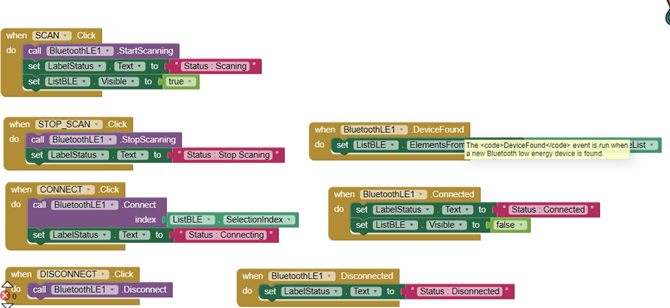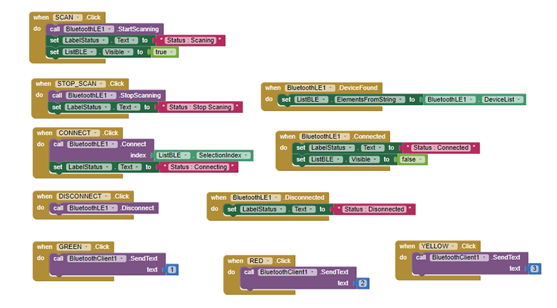// ArduinoBLE - Version: Latest
#include <ArduinoBLE.h>
/*
LED
This example creates a Bluetooth® Low Energy peripheral with service that contains a
characteristic to control an LED.
The circuit:
- Arduino MKR WiFi 1010, Arduino Uno WiFi Rev2 board, Arduino Nano 33 IoT,
Arduino Nano 33 BLE, or Arduino Nano 33 BLE Sense board.
You can use a generic Bluetooth® Low Energy central app, like LightBlue (iOS and Android) or
nRF Connect (Android), to interact with the services and characteristics
created in this sketch.
This example code is in the public domain.
*/
BLEService ledService("180A"); // Bluetooth® Low Energy LED Service
// Bluetooth® Low Energy LED Switch Characteristic - custom 128-bit UUID, read and writable by central
BLEByteCharacteristic switchCharacteristic("2A57", BLERead | BLEWrite);
const int led1 = 2; // pin to use for the LED
const int led2 = 3;
const int led3 = 4;
const int ledPin = LED_BUILTIN;
//const int led4 = 5;
void setup() {
Serial.begin(9600);
while (!Serial);
// set LED pin to output mode
pinMode(led1, OUTPUT);
pinMode(led2, OUTPUT);
pinMode(led3, OUTPUT);
//pinMode(led4, OUTPUT);
digitalWrite(LED_BUILTIN, LOW); // when the central disconnects, turn off the LED
digitalWrite(led1, HIGH); // will turn the LED off
digitalWrite(led2, HIGH); // will turn the LED off
digitalWrite(led3, HIGH); // will turn the LED off
//digitalWrite(led4, HIGH); // will turn the LED off
// begin initialization
if (!BLE.begin()) {
Serial.println("starting Bluetooth® Low Energy module failed!");
while (1);
}
// set advertised local name and service UUID:
BLE.setLocalName("Nano 33 BLE Sense");
BLE.setAdvertisedService(ledService);
// add the characteristic to the service
ledService.addCharacteristic(switchCharacteristic);
// add service
BLE.addService(ledService);
// set the initial value for the characeristic:
switchCharacteristic.writeValue(0);
// start advertising
BLE.advertise();
Serial.println("BLE LED Peripheral");
}
void loop() {
// listen for Bluetooth® Low Energy peripherals to connect:
BLEDevice central = BLE.central();
// if a central is connected to peripheral:
if (central) {
Serial.print("Connected to central: ");
// print the central's MAC address:
Serial.println(central.address());
digitalWrite(LED_BUILTIN, HIGH);
// while the central is still connected to peripheral:
while (central.connected()) {
// if the remote device wrote to the characteristic,
// use the value to control the LED:
if (switchCharacteristic.written()) {
switch (switchCharacteristic.value()) { // any value other than 0
case 01:
Serial.println("led1 on");
digitalWrite(led1, LOW); // will turn the LED on
digitalWrite(led2, HIGH); // will turn the LED off
digitalWrite(led3, HIGH); // will turn the LED off
break;
case 02:
Serial.println("led2 on");
digitalWrite(led1, HIGH); // will turn the LED off
digitalWrite(led2, LOW); // will turn the LED on
digitalWrite(led3, HIGH); // will turn the LED off
break;
case 03:
Serial.println("led3 on");
digitalWrite(led1, HIGH); // will turn the LED off
digitalWrite(led2, HIGH); // will turn the LED off
digitalWrite(led3, LOW); // will turn the LED on
break;
default:
Serial.println(F("LEDs off"));
digitalWrite(led1, HIGH); // will turn the LED off
digitalWrite(led2, HIGH); // will turn the LED off
digitalWrite(led3, HIGH); // will turn the LED off
break;
}
}
}
// when the central disconnects, print it out:
Serial.print(F("Disconnected from central: "));
Serial.println(central.address());
digitalWrite(LED_BUILTIN, LOW); // when the central disconnects, turn off the LED
digitalWrite(led1, HIGH); // will turn the LED off
digitalWrite(led2, HIGH); // will turn the LED off
digitalWrite(led3, HIGH); // will turn the LED off
}
}

